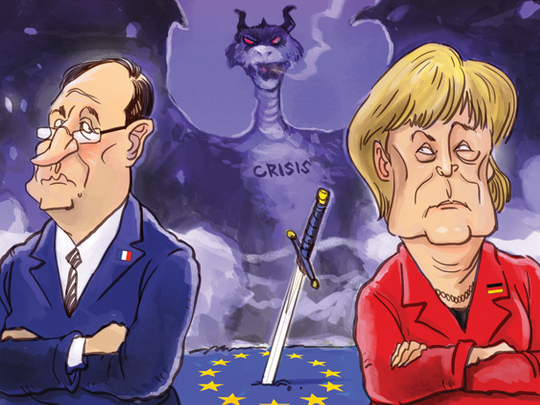
Never has it been so important for the nations of the European Union (EU) to be united. But never has the European project been more endangered by indifference, hostility and even open rejection.
Can we bridge this gap — and where would the impulse to do so come from? With one commissioner per member state, the European Commission cannot be an executive body. The heads of state do not want the president of the European council to lead; and a federal EU is unlikely in view of the current economic and political balance of power within the union.
So one is left, as always, with the Franco-German partnership. However, the traditional idea of the “Franco-German motor essential to the advancement of Europe” is losing credibility with the growing discrepancy between the two economies, the widening differences in national interests and the weakening of political will to build Europe together.
Let’s be clear: The relationship has never been a love affair. With the exception of the periods in office of Helmut Schmidt and Valery Giscard d’Estaing or Helmut Kohl and Francois Mitterrand, happy times were always shortlived, with ulterior motives, frustrations and misunderstandings ever present. France still has not digested Germany’s reunification and Germany has always distrusted the patronising volatility of the grande nation. Beyond official statements, what was always a marriage of convenience has now become a cohabitation stamped with distrust.
This is not surprising. A number of things divide France and Germany — from geography to collective memory, culture and constitutional structure to economic policies and globalisation. The necessity to ensure peace and the will to advance European unification have been the only real cement. In addition, Germany was confined to an inferior status for 40 years: Its economic power had to be accompanied by a reduced role in foreign policy.
Now the context has fundamentally changed. The US is retreating, Russia remains unpredictable and China’s weight is increasing. Europe is divided and France is weakened. Germany is not only the dominant economy, but for the first time also declares itself ready to take on more international responsibility. That could either represent a risk or a great opportunity. The risk is that instead of rapprochement, mutual tensions will increase and the pair will drift further apart. The opportunity is a reformed relationship and a global New Deal between France and Germany.
Policy of austerity
In terms of the economy, there can be no Franco-German partnership if the gulf between the two economies grows. France needs to get closer to Germany on corporate taxation, the level of social security contributions, reform of the labour market and reduction of public spending — in particular the financing of welfare benefits. In return, Germany must rethink its position regarding the policy of austerity, the role of the European Central Bank and the sharing of debt. If both countries achieve that, they will be able to establish a close cooperation for the leadership of the Eurozone, which will in turn become the core of the EU.
That is what is at stake for Manuel Valls, the French Prime Minister, and Angela Merkel, the German Chancellor. At the same time, a new deal is also required on foreign policy. Germany needs to overcome its postwar pacifism and become more involved in the crises increasingly breaking out on Europe’s doorstep. France needs to be willing to share decisions with Germany on the main issues. Both should also be clear on defence policy. That inevitably involves the question of a permanent seat on the United Nations Security Council and the role of France’s nuclear deterrent.
If there is one area where they have both the capacity and duty to work together, it is on a European policy towards Russia, with the aim of founding the security of the continent on a new basis. As Ukraine amply demonstrates, this is a priority.
All the above will require a cultural revolution. If no one takes the initiative we will have to say goodbye to our historical vision of integration. But if the leaders have the courage to join forces for the good of Europe, the EU has a chance for a new beginning. If we want to avoid a rejection at the next European elections we have to act now: history will not spare those who fail to seize this opportunity.
— Guardian News & Media Ltd
Gerard Errera is a former secretary-general of the French ministry of foreign affairs. Wolfgang Ischinger is a former secretary of state at the German foreign office and chairman of the Munich security conference. Both were ambassadors to the UK.









